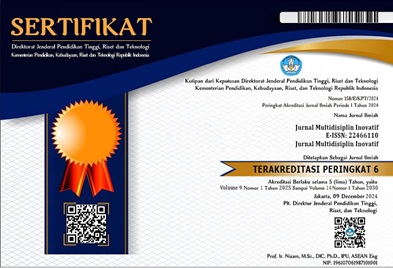“PENYELESAIAN SENGKETA DUA YAYASAN TERKAIT DENGAN ASET TANAH WAKAF (STUDY PUTUSAN NOMOR 488/PDT.G/2023/PA.MTP)”
Kata Kunci:
Sengketa Tanah Wakaf, Pertimbangan Hakim, YayasanAbstrak
Tujuan penelitian ini adalah untuk menganalisa penyelesaian sengketa tanah wakaf dan menganalisa pertimbangan putusan hakim tersebut. Adapun jenis penelitian yang peni gunakan adalah jenis penelitian hukum normatif. Pendekatan dalam penelitian ini menggunakan pendekatan Undang-Undang (Statue Approach) dan Pendekatan Kasus (Case Approach).Hasil Penelitian yang diperoleh berkaitan dengan Penyelesaian Sengketa Dua Yayasan Terkait Dengan Aset Tanah Wakaf (Study Putusan Nomor 488/Pdt.G/2023/PA.Mtp). Undang-Undang Wakaf Nomor 41 Tahun 2004 Tentang Wakaf menjelaskan bahwa: wakaf adalah perbuatan hukum wakif untuk memisahkan sebagian benda miliknya, untuk dimanfaatkan selamanya atau dalam jangka waktu tertentu sesuai kepentingannya guna keperluan ibadah dan/atau kesejahteraan umum menurut syariatUntuk mengetahui penyebab terjadi sengketa Yayasan pada kasus putusan 488/Pdt.G/2023/PA.Mtp, Untuk menganalisa legal reasoning pertimbangan hakim dalam putusan sengketa Wakaf pada putusan 488/Pdt.G/2023/PA.Mtp. Baik Putra maupun Putri pada awal mula berdirinya itu bergabung dalam satu yayasan yang sama yaitu Yayasan Pondok Darul Hijrah yang terletak di Cindai Alus Martapura Kabupaten Banjar, namun sekarang sudah berpisah, masing-masing dikelola oleh Yayasan yang berbeda, muncul permasalahan ini peratama seharusnya yang menduduki sebagai pimpinan Pondok Darul Hijrah tersebut ialah dari alumni Pondok Modern Darussalam Gontor Ponorogo atau Alumni Pondok Darul Hijrah tersebut sesuai dengan embrio pendiri pondok, kedua pada saat dibuat Akta Ikrar Wakaf untuk Ponpes darul Hijrah Putri pada tahun 2016. Undang-Undang Nomor 48 Tahun 2009 tentang Kekuasaan Kehakiman, dimana dirumuskan bahwa kekuasaan kehakiman adalah kekuasaan negara yang merdeka untuk menyelenggarakan peradilan guna menegakkan hukum dan keadilan.Sehingga hemat peneliti, Majelis Hakim telah menjalani nilai-nilai yang ideal sebagai Majelis Hakim, dimana hal itu telah diatur pada Peraturan Bersama Mahkamah Agung dan Komisi Yudisial No. 02/PB/MA/IX/2012–02/PB/P.KY/09/2012 tentang Panduan Penegakan Kode Etik dan Pedoman Perilaku Hakim dalam Bab II Kewajiban dan Larangan Pasal 4, yang salah satu poinnya adalah “Hakim harus Arif dan Bijaksana.
The purpose of this study is to analyze the settlement of waqf land disputes and analyze the consideration of the judge's decision. The type of research that peni uses is a type of normative legal research. The approach in this study uses the Law (Statue Approach) and Case Approach.The results of the research obtained are related to the Settlement of Disputes between Two Foundations Related to Waqf Land Assets (Study Decision Number 488/Pdt.G/2023/PA. Mtp). Waqf Law Number 41 of 2004 concerning Waqf explains that: waqf is a legal act of waqf to separate part of its property, to be used forever or for a certain period of time according to its interests for the purposes of worship and/or general welfare according to sharia. Mtp, To analyze the legal reasoning of the judge's considerations in the decision on the Waqf dispute in decision 488/Pdt.G/2023/PA.Mtp. Both the Son and the Princess at the beginning of its establishment joined the same foundation, namely the Pondok Darul Hijrah Foundation which is located in Cindai Alus Martapura, Banjar Regency, but now it has separated, each managed by a different Foundation, This problem arises that the person who should occupy the leadership of the Darul Hijrah Boarding School is from the alumni of the Pondok Modern Darussalam Gontor Ponorogo or the Alumni of the Pondok Darul Hijrah in accordance with the embryo of the founder of the boarding school, the second at the time of making the Waqf Pledge Deed for the Darul Hijrah Women's Islamic Boarding School in 2016. Law Number 48 of 2009 concerning Judicial Power, where it is formulated that judicial power is the power of an independent state to hold the judiciary to uphold law and justice. So that it is economical for researchers, the Panel of Judges has undergone ideal values as a Panel of Judges, where it has been regulated in the Joint Regulation of the Supreme Court and the Judicial Commission No. 02/PB/MA/IX/2012–02/PB/P.KY/09/2012 concerning Guidelines for the Enforcement of the Code of Ethics and Guidelines for Judges' Conduct in Chapter II of the Obligations and Prohibitions of Article 4, one of the points of which is "Judges must be Wise and Wise.





